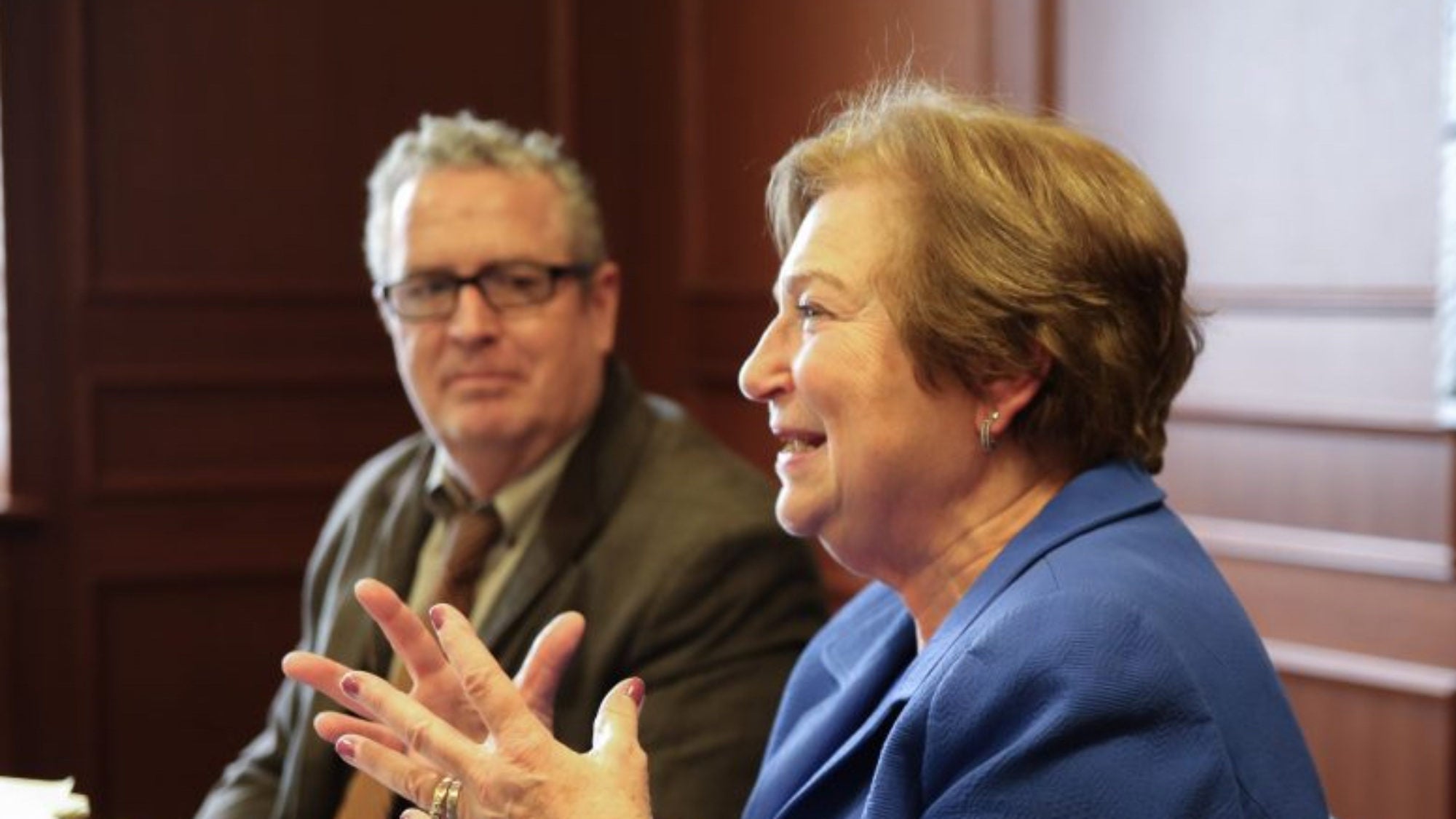Dr. Angela Stent, Director of the School of Foreign Service’s Center for Eurasian, Russian, and East European Studies (CERES) program, discussed her newly released book Putin’s World: Russia Against the West and with the Rest with CERES Senior Fellow Dr. Andrew Kuchins, on Wednesday March 20, 2019. The book tackles a number of topics: Russia’s rise to global power status following the collapse of the Soviet Union, Putin as a strategist, Russia’s interests and relations to sensitive global regions, namely the Middle East and China, how Moscow has balanced its global power while maintaining its opposition to the West, and the country’s future, particularly as it pertains to U.S. foreign policy.
While writing the book, Stent drew on her experiences at the National Intelligence Council during the early 2000s, where the specter of Russia and its future was a common topic of discussion. At that time, Stent, along with her colleagues, never imagined that Russia would attain the prestige it has today. Stent explained that this was her inspiration for writing the book, it was “an attempt to understand why we underestimated Russia.” In her research, she also sought to understand how the U.S. and other observers “[got] it so wrong in the 1990s, thinking that post-Soviet Russia would want to be like the West,” especially given the indications that Russian history provided on the likely trajectories of Post-Soviet Russian development. Stent admitted that at the start the writing process, she wasn’t quite sure what the final draft would look like. However, as she progressed, Russia continued to assert itself in in global affairs with increasing aggression, providing her with material. She noted that she wrote the chapter on U.S.-Russia relations last: “I managed in November to get Michael Cohen’s conviction in…Russia was now a part of domestic policy more than it’s ever been, since the McCarthy era, which is different.”
A major question that Stent explored in her book was the extent that Putin has influenced the position that Russia finds itself today; is Russia’s current state a direct product of Putin’s leadership or has the country’s geopolitical development followed a predetermined and inevitable path? “The mindset that Russia is a great power and is insecure if it doesn’t have buffers around it did not begin with Putin,” Stent argued. However, she asserted that Putin has always been an excellent strategist and opportunist. Stent elaborated that Putin’s skill as a leader lies in his ability to first identify spheres in which the West has been distracted, and then take advantage of those distractions. She referenced Putin’s background in the KGB, noting that the people he directly surrounds himself with are either ex-KGB or somehow tied to the intelligence world. Considering these factors, Stent said: “I don’t know whether another Russian leader from a different background would’ve done the same thing.”
A notable aspect of Russian foreign policy is the diversity of relations it successfully maintains in different parts of the world. For example, Moscow has a particular closeness with Beijing, positive relations with many Middle Eastern countries, as well as developing links to Latin America. However, Stent pointed out that the Russia-China relationship may be souring. As of now, she explained, the two countries interact in Central Asia, the region where their spheres of influence overlap, with an understanding that there is a division of labor. While Russia positions itself as a security provider for the neighboring states, China has attempted to solidify its role as the major economic power of the region–an arrangement agreed on by both countries. However, as China embarks on the Belt and Road initiative, it increasingly impinges on Russia’s security realm. Stent hypothesizes that this new arrangement will not “be stable in the long run.”
Stent concluded with a look to the future–she suggested three courses of action to improve U.S. policy regarding Russia that would be useful to the next presidential administration. Firstly, Stent advised being realistic, and recognizing and accepting Russia’s uniqueness. Next, ensure “better defenses against election and cyber interference” rather than more sanctions. Finally, Stent advises that the U.S. should “restore some of the channels of engagement we’ve had with Russia.” She expressed concern that increasingly the only communication between the two countries is on a military basis, to coordinate Russian and American personnel in Syria. “Even in the Cold War, we had regular channels of communications between the U.S. and the Soviet Union.” Ultimately, restoring channels of engagement is necessary “in order to achieve strategic stability.”
